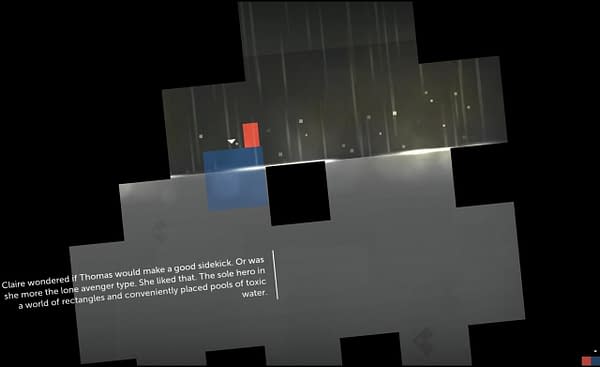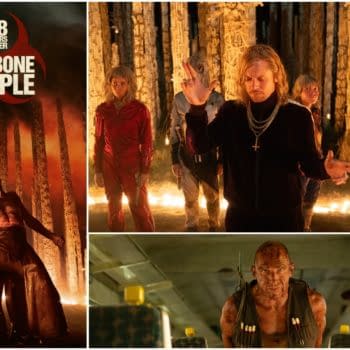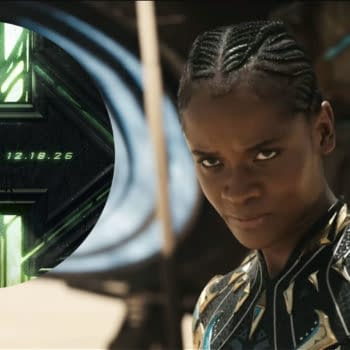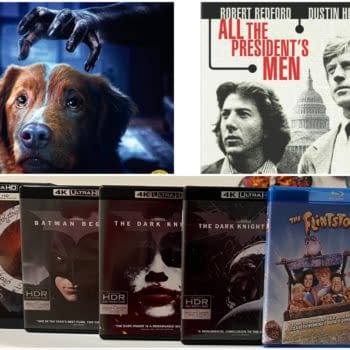Posted in: Movies, Recent Updates, Video Games | Tagged: Brian Baglow, Dave Sapien, David Housden, Edinburgh Film Music Orchestra, Edinburgh Games Symposium, entertainment, indy games, Jacob Pernell, Malath Abbas, Thomas Was Alone, Tom DeMajo, video games, Vincente Diamante, Yann Seznec
The Sweet Sound of Success: Edinburgh Game Symposium 2.0
By Phil Harris
Nestled in the middle of the Edinburgh international Film Festival is the Edinburgh Games Symposium. Back for its second year, and bigger then ever. The symposium was looking at a variety of subjects in the game industry with a significant emphasis on music in game, an area which is often missed due to the freelance nature of the subject within the industry.
Starting the event the symposium director, Jacob Pernell, welcomed the delegates, thanked the sponsors and gave an overview of the days events before we kicked into the first panel concerning games development. Chaired by the ubiquitous director to the Scottish Games Network, Brian Baglow, the panel include Malath Abbas (Quartic Llama), Yann Seznec (Lucky Frame) and Dave Sapien (independent game developer).
Starting with an introduction of the panelists, which you can discover more about by following the links, we moved into the first question concerning the last few projects each had worked on. Abbas talked about their collaboration with the National Theatre of Scotland for Other, a game experience which tied in with the stage play based on the book/film Let The Right One In. Other took people on an interactive tour of the city of Dundee whilst maintaining the Gothic horror theme of the play, with the city itself becoming one of the characters in the game that the player was interacting with. The development leading Quartic Llama to do a game jam with local school children and a sound jam, considering sound experience in game.
Seznec then talked about the Nightmare Cooperative, a puzzle game know as a roguelike in the industry, which has a back story of corrupt village councils spending money and is released soon. Many of their other projects involve music and Seznec talked about Bad Hotel and other products they had worked on, like Roflpiller where you play two caterpillars and move around with boxes on your head.

Baglow asked if the media was fixated by the AAA industry and Sapien was quick to note that it, "pisses me off", and that the top ten games of all time included Tetris, Wii Sports and Minecraft at the top three, none of which are AAA. It proves that new games can be experimental. Seznec agreed, noting that the AAA may get all the coverage but that the indie scene in games expos and conferences was rich with ideas; it depressed him that the number of explosions equalled popularity but the rich underseam of indie was still there. Abbas felt it gave an opportunity to fight back in a different way, the bad stuff needs to exist so they can create new unique designs. The more he creates games the more he considers what games he wants to play, pursuing the quality over blockbuster productions.
Another thing, Baglow noted, was the number of devices that games can be developed on, better than the film industry which has only one direct media to play to. Seznec noted that the production cycle had gotten easier in games but the distribution had become far, far easier. Music and film have public performance and Seznec talked about an open accessible fun games project in January with Tacos, Blue Grass and Videogames which deliberately concentrated on non violent games. The whole project, and others about the world, concentrating on demystifying games to the general public and open the industry up to finer scrutiny.
Opening the questions up to the public the issues of distribution came up, considering if animation could follow the same path as games. Sapien saw the possibilities but Seznec noted that though distribution was easy success was far harder, Abbas agreeing and saying that since game development has become interactive, talking to their followers on social media, it has developed.
Sapien noted that to help find games you need to build your fan base and sell the magic of your game. It's difficult to make a game and the "magic" behind it is a significant difficult to quantify and Seznec talked about saturation of the market is a worry but Steam is constantly growing so people are still buying games, but at some point there will be friction. As games break out onto other devices then the potential for new markets is there.
In the end, the panel agreed that the games processes follow those of the rest of the creative arts, you need to work hard to prove that things which are not standard can become an expected form within the games media. Some of the problems with the industry were the issues with educational courses expecting students to use certain tools or develop for certain media and that this blinkered view needed to change.
Following lunch, where various studios showed off their latest designs and concepts, the afternoon session was a panel of game composers including Tom DeMajo (Quartic Llama), Vincent Diamante (thatgamecompany) and David Housden who worked on the audio of the game Thomas Was Alone.
After the introductions from each panelist Baglow talked about audio being the poor relation of the videogames industry. DeMajo felt that we have become a very visual species, which is why graphics takes priority, but with the photorealism of the graphics hitting a plateau the use of music and audio becomes of far greater importance, creating a balance between as many of the senses as possible; leading to an interconnected experience. "It's horses for courses", said Housden, explaining that if he was approached by a company who saw music as secondary to the rest of the game then he wasn't really interested in working with them as they needed to understand the importance of the audio\music in the game. However he did note that there was the potential to develop a rapport with the company by working with them in the hopes that you could prove the value of audio with them.
"Music is gaining respect", Diamante noted, explaining that music was fundamental in the process of design and evolution of thatgamecompany and what they do. He saw more recognition of this in the fans, identifying the popularity of the composers of series such as Final Fantasy with Baglow adding to the discussion by mentioning the sound tracks which are included in the Humble Bundle's.
"For a game you need every aspect to be equal", DeMajo noted, Diamante saying how it was difficult to justify the use of music to promote the game in the past, because of its status in the medium, but how he valued what he had now, where his soundtrack and audio was a part of something greater. "…something sublime and special", said DeMajo in support. Diamante came back in, talking about the way music in games was evolving to create an emotional and engaging part. Speaking about Flower and how he had considered how the instrument the player was engaging with took part within the game.
Baglow asked about the increase in sound creation and playing with sound in games, not simply rhythm action games and Guitar Hero but also other games which allow a more abstract form of gaming. Diamante was delighted we were creating more games like that and DeMajo was delighted we were inviting people to take part of the creative process, making a more human collective experience.
Questions from the audience started with a query about how you convinced the developers that sound was important. Housden said that you still should take the jobs but by developing relationships with studios you can start to discuss what you could have done. The only way they are going to learn is by understanding what the sound could have potentially been. You also become more responsive to a project as you are given more freedom and potential to design the audioscape.
This moved on to why you should never work for free. No one should be asked this and even if the arrangements are for a percentage share of the project, and that project ends up earning nothing, you are still protecting your rights to that percentage. In the end the team were discussing the issue that anything you design has value and worth and that you should never sell yourself short.
The next audience question concerned the combination of narrative and audio. Housden noted he had been pushed out of his comfort zone in designing a multilayered looped track for Thomas Was Alone meaning everyone's sound experience was different, as the loops played at different times but he had to get an emotional grasp of the subject and sound design for each level. DeMajo talked about the fact this whole process could seem overawing but if you had fun then it made the process significantly easier and Diamante wanted to point out that loops in games should not be seen as boring, it represents something familiar and comforting, creating so much potential in sound and what the player is doing and experiencing.
Further questions covered the field of new technology and using live instruments. On both these subjects, the panel were unanimous saying that creating the music and soundtrack for the games was not dependent on the quality of the equipment used but that the composer can show their true ability by the music they compose and the way it integrates with the game. On the second, they made the point that although live musicians created a higher quality of sound this may not always fit with the gameplay and could, in fact, restrict some of the other parts of the whole interactive media that the game was trying to produce.
In the evening we were treated to a short, but free, concert of videogame music where Diamante got to hear one of the tracks from Flower performed live for the first time. The Edinburgh Film Music Orchestra didn't disappoint either, matching the quality of the more famous Video Games Live performances and the second day of workshops also provided excellent detail for those interested in specific industry subjects, too complex to cover in detail here.
For all sessions the panels were totally engaging the audience, responding well to their questions asked and explaining the points they made well. It showed off their own talents and knowledge but also how happy they were to share their concepts, thoughts and knowledge of the industry.
Considering the cost, hosting and quality of the event Edinburgh Games Symposium 2.0 should be something people interested in the industry should consider next year: Notwithstanding the fact it is nestled in the beautiful capital of Scotland.
Phil Harris (@PhilipGHarris) is a games developer who is currently working with One Thumb Mobile on their MMORPG Celtic Heroes. He also writes for Pixels for Breakfast.


















